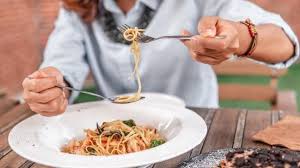Source: skystatement.com
Many people try to avoid carbohydrates as they’re often looked at as the “enemy”.
But a dietitian has revealed what happens to your body when you eliminate the essential food group from your diet.
While we all need a slightly different amount of carbs depending on our bodies and how active we are, the Australian Dietary Guidelines recommend adults eat between three and six serves of carbs a day.
“Carbs are our body’s preferred energy source. There is no need to cut them from our diet,” Sydney-based dietitian Lyndi Cohen explains, adding it’s all about “quality”.
“There is no research to suggest that completely cutting out carbs is healthier for you in the long run.”
“According to the most recent food intake data from the Australian Bureau of Statistics, one third of Australians’ energy intake comes from discretionary foods. Ideally, less than 10 per cent of all energy should come from ‘sometimes’ foods like pies, biscuits, chocolate, sugar in teas and coffee and alcohol.”
Ms Cohen said her patients tended to tend to eat more discretionary foods when they didn’t fuel up with enough carbs and vegetables because they didn’t feel satiated.
“I think the wellness world has become unhealthily obsessed with protein, so much that it can create an imbalance in your diet,” the SunRice ambassador said.
“Research consistently shows that diets with plenty of variety including wholegrains and other plant-based foods benefit your gut health and wellbeing.”
According to Ms Cohen, cutting carbs from your diet compromises gut health and could also affect concentration levels.
“When you first cut out carbs, your body has to begun using fat for energy by converting it into glucose,” Ms Cohen said. “With time, your body will get better at using fat as a fuel source but it can take a while to get used to this.
“This may explain why you can feel weak, fatigued, dizzy and irritable or get a headache in the days or weeks after cutting out carbs.”
DO YOU NEED TO CUT CARBS TO LOSE WEIGHT?
Ms Cohen said many people thought they needed to cut carbs to lose weight.
“Realistically, the reason most people want to cut out carbs is because they think it’ll help them lose weight,” she told news.com.au
But according to Medical News Today’s study on the ‘largest’ microbiome, you don’t need to cut it out.
“Carbohydrates contain fewer calories gram for gram than fat and tend to be a source of fibre, which is linked to a lower weight. The idea that you need to cut out carbs from your diet to lose weight is wrong,” she said.
“You can be healthy, have a healthy weight and enjoy carbs by simply making healthier carb choices that are wholegrain carbs, ideally that are low GI.”
Ms Cohen said it was all about quality.
“Choose wholegrains and brown options like wholegrain bread, brown rice, quinoa, barley, oats, fruit and starchy vegetables like sweet potato, corn and peas,” she said.
For those who exercise intensely, adding more high-quality carbs into your diet is going to help fuel better quality workouts, Ms Cohen explains.
“This may help you gain strength, have more stamina and, ultimately, you may enjoy the workout more as you have more energy so you’re able to be more consistent,” she said.
“From my experience, many people tend to undereat when they start training because they’re ‘trying to be good’. Ultimately, not eating enough when you exercise may make you feel tired, depleted and hungry.”
“When this happens, you may end up eating more in the long term – and end up choosing less healthy options – as your willpower is depleted.”
Ms Cohen suggests those who train to add 1-2 additional serves of carbs to their diet such as a banana before a workout or a serve of brown rice and quinoa with salad at lunch.
“If you’re training for longer sessions and want to feel your best, you may want to speak to a sports dietitian to get specific, personalised advice,” she said.
NOT EATING ENOUGH CARBS LEADS TO SNACKING
While it seems counterintuitive, Ms Cohen said adding in more food could help you make healthier choices and feel better than trying to eat too little.
“Many of my clients don’t eat enough healthy, satiating foods like wholegrains during the day,” she said.
“I find this can lead to uncontrollable snacking or overeating on unhealthy options, most often after work or dinner.”
Ms Cohen explained that due to low-carb diet trends, the healthy wholegrain salad sandwich had been replaced by carb-free salads.
“They may be better off including 1-2 serves of carbohydrates for lunch, which may help them feel satisfied and prevent evening overeating,” she said.
